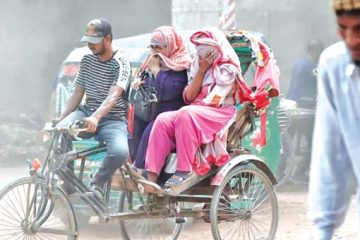Views
RMG NOTES
Climate Action
Without fashion retailers and their suppliers working together, our industry as a whole will continue to see emissions rising.
Mostafiz Uddin
According to the latest report of the UN Intergovernmental Panel on Climate Change (IPCC), the world is likely to fail to reach its most ambitious climate target – limiting global warming to 1.5 degrees Celsius above the preindustrial temperatures. The report warns that now is our last chance to avert a climate disaster. Many believe that unless governments around the world opt for the most aggressive climate change policies, the world is just 10 years away from either catastrophic climate change impacts or some form of greenhouse gas (GHG) emission “tipping point,” at which such change will become inevitable.
Reading such reports breeds a certain sense of helplessness, but there is work we can all still do – and we must start immediately. From a personal perspective, I think the most important keyword right now is partnership. Climate change is a joint problem that requires collaborative solutions across supply chains.
In the RMG industry, we keep hearing the same message. The only way the global fashion sector will achieve its goals is by reducing carbon emissions in supply chains. Is this happening? Sadly, no. A recent report by a US-based environmental NGO assessed the progress of many of the world’s leading fashion brands in reducing supply chain emissions. The bad news is, emissions are actually rising – at precisely the wrong time.
Many people are talking about the need to “decouple” growth from carbon emissions. That way, fashion brands can continue to grow while also stabilising or reducing emissions. I accept that. I also accept that our customers need to grow. To standstill is to die in business, we all know that.
There is some talk of “degrowth” as a new form of economic system. That’s all well and good, but where does it leave supply chains? The answer is: a huge number of job losses. Degrowth has huge negative social consequences for developing countries like Bangladesh. So growth – decoupled from emissions – is the only option as far as I can see.
The problem is that decarbonisation is simply not happening. I’ve been watching this situation for a decade. Without radical change, I don’t believe our industry will hit climate targets.
What might the radical actions entail? It comes back to that word – partnership. There is a lot of discussion about suppliers and their customers working collaboratively. Yet, talks are all we have had so far. There is very little in the way of genuine partnership. For me, without fashion retailers and their suppliers working together, our industry as a whole will continue to see emissions rising. Decoupling will not happen.
What’s frustrating is that I look at other industries and I feel sure we are missing a trick. Some of the world’s largest multinationals in other sectors have been developing mutually beneficial relationships with suppliers for more than a decade, investing heavily in supply chains to meet environmental, social and governance (ESG) goals. Many are taking a financial stake in their major suppliers, ensuring that their fortunes are collectively tied together. Why is our industry not following suit? There has to be a better way. In fact, there is no choice but to find a more collaborative approach.
This is about more than just suppliers and fashion retailers, however. The key to decoupling is shifting to renewable energy use in supply chains. This means we need governments, energy/utility companies and development agencies included in these partnership conversations. We all need a place at the table so we can figure out how we are going to finally crack the carbon emission conundrum.
As I write this, we are already a quarter of the way through 2023. When one considers this, the realisation that 2030 will soon be upon us comes into clear focus. Will we still be having these same conversations in 2024? 2025? Will we still be having discussions around purchasing practices? Will we still be arguing over who funds the “greening” of garment supply chains – be it suppliers or brands? Will we still be talking about the need to leverage external investment?
Personally, I’m tired of the talk. I want to see clear, practical plans which set out what we need to do collectively to reduce emissions. It’s time to develop a broad industrial strategy, with input from our international partners and a focus on decarbonisation.
I hear a lot of criticism of fashion retailers and some talk of greenwashing. My personal view is that most sustainability leaders in the fashion industry want to do the right thing and help make the world a better place. But they can’t do it on their own. They need their suppliers just as much as we need them. Let’s work together and start making a real difference.
Mostafiz Uddin is the managing director of Denim Expert Limited. He is also the founder and CEO of Bangladesh Denim Expo and Bangladesh Apparel Exchange (BAE).








